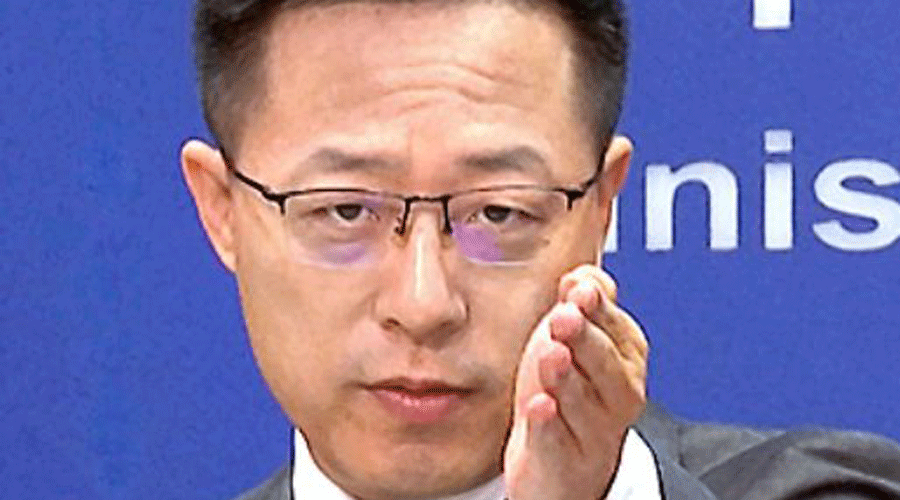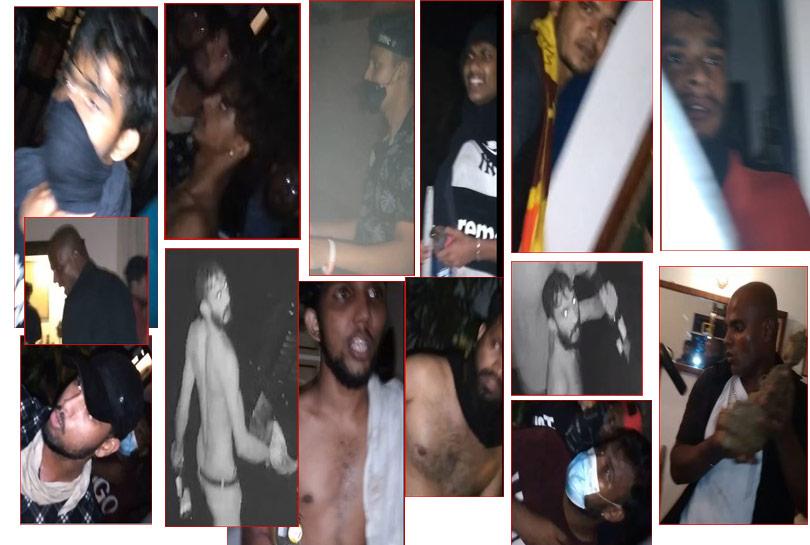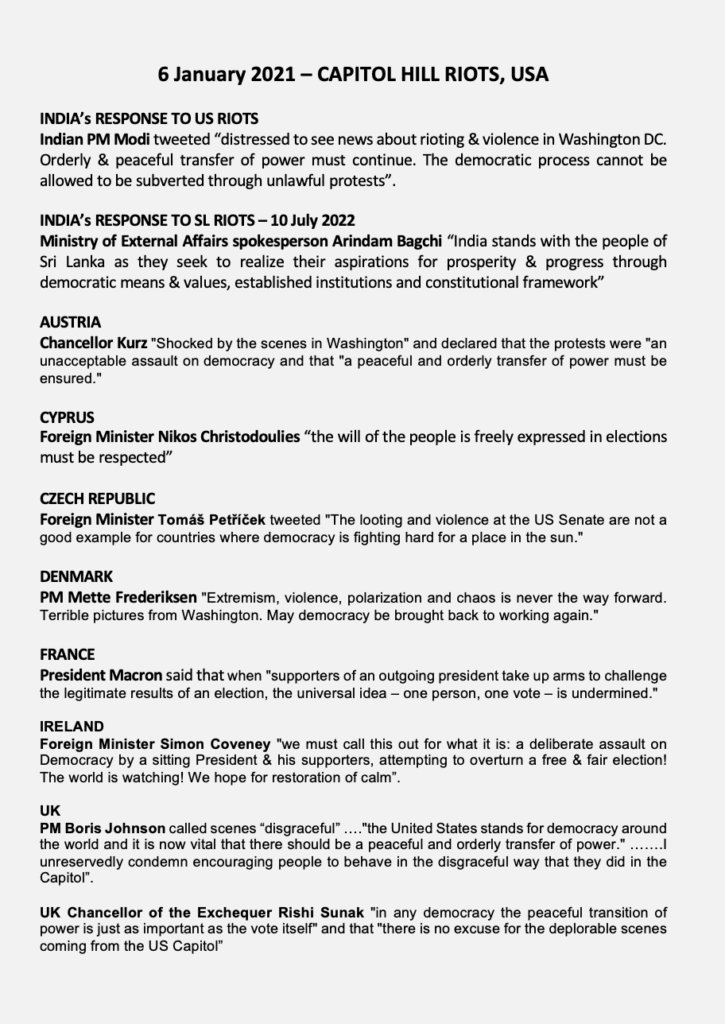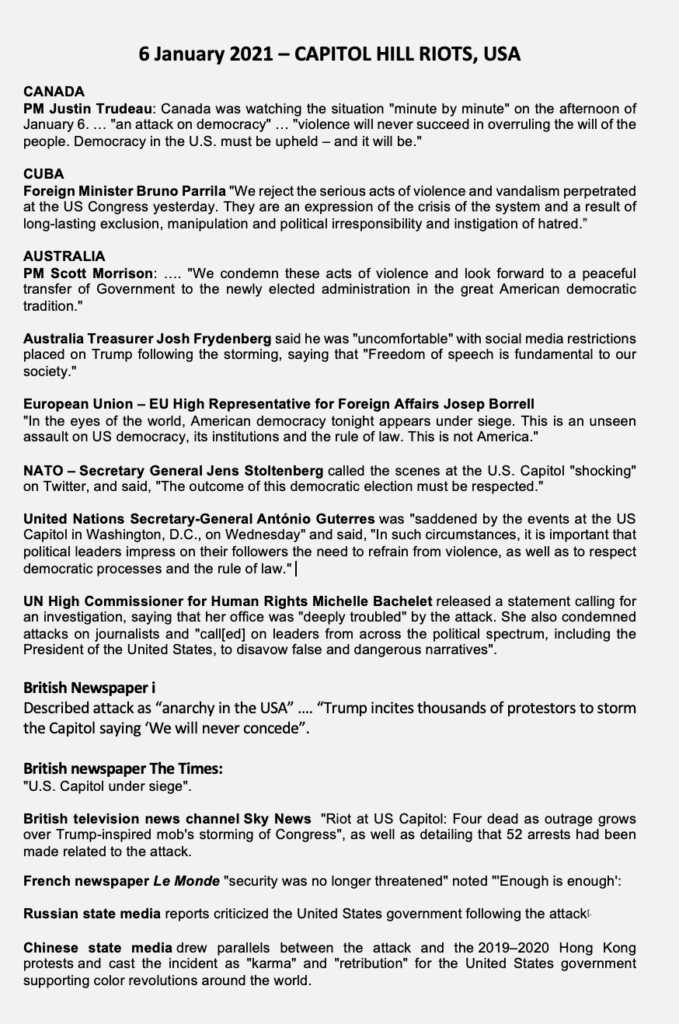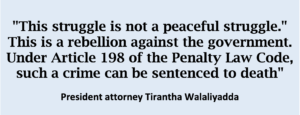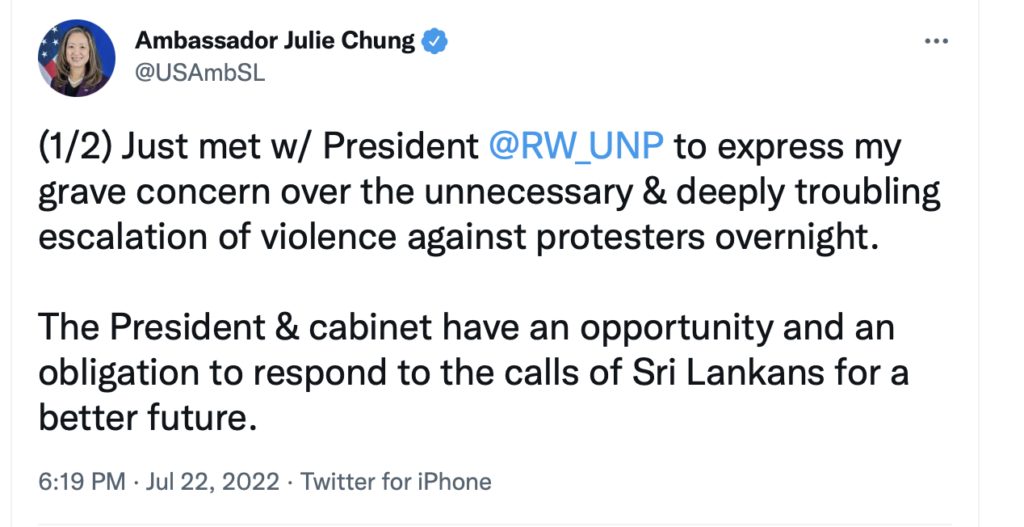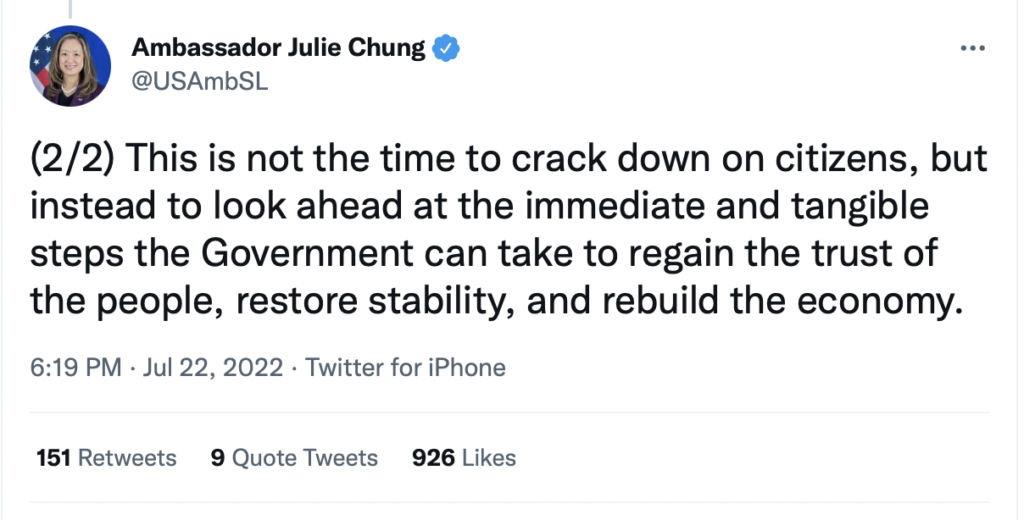KAMALIKA PIERIS
1987–89 JVP INSURRECTION
JVP staged a second uprising which lasted from 1987 to 1989. This was not an open revolt, but a low intensity conflict with the JVP resorting to assassinations, raids and attacks on military and civilian targets. With these practices of fear and intimidation, the JVP was able to bring the country to a standstill. This campaign virtually brought the country to a standstill confirmed Indradasa. It was known as period of terror.
The situation in 1987 was different 1971 said Air vice Marshal Sosa. The strategy this time was to avoid direct confrontation with the nation’s defence mechanism but harass the public to a state of despair.
The day the insurgency broke the JVP assassinated Member of Parliament of Tangalle Jinadasa Weerasinghe and burnt to the ground the residence of MP for Ambalantota Dr P M B Cyril. Bus depots were set ablaze along with the buses. All light poles (wooden) were cut down, trunk roads were blocked by felling trees, shops had been ordered to close and Public Servants to keep away from work.
JVP had some support initially among the public, especially in the southern and central districts, after JVP challenged the Indo-Sri Lankan Accord. JVP seemed to enjoy public support in Matara, Hambantota, Moneragala, Badulla, Kurunegala and in the Uva Province as well and successfully carried out various strikes, work-stoppages, protests and boycotts, in 1987
JVP resorted to sheer terrorism to bring about work stoppages, disruption to transport services and trade . JVP burned down post offices, robbed the collections from bus conductors, and destroyed their ticket machines, damaged industrial and domestic electricity and water meters. JVP forcibly collecting vehicle revenue licenses. JVP destroyed records held in kachcheries including files on local taxes and land registers.
Almost two thirds of the country did not have an electricity supply for more than six weeks, because the power pylons in Matale were destroyed by the JVP. JVP repeatedly went for electric transformers. There were other acts of sabotage with the destruction of Government property. There was also a campaign to boycott Indian goods.
JVP crippled the country with violently enforced general strikes for two years. Many individuals or organizations were warned or intimidated with messages dropped in the night in front of homes and with posters or graffiti on walls. Those that did not cooperate were brutally killed, with the repercussions extended to their family members. Grama Sevaka were directed to hand over their resignations under threat of death.
JVP issued death threats to professionals, to lawyers and doctors so they could not work. JVP called for hartals and work stoppages. JVPs repeated warning to State-owned media personnel to stay away from work and increasing threats led to resignations. As a result, trains were not functioning properly, schools and college did not hold exams for almost two years.
For four years no one had graduated from any of the state universities. Medical College was not functioning for almost five years. Factories and work place were forced to close down for long periods resulting in the workers undergoing severe hardship and production suffered. Strikes paralyzed key government departments. Tourists were walking past immigration and customs counters freely as the officers were not there.
JVP called upon the public to engage in a civil disobedience campaign by refraining from paying taxes and other dues such a bus fares. Posting letters’ without stamps. JVP said people must observe curfew and not leave homes, work places should shut down, transport must cease to operate, blackout must be observed from 6 pm. People should refrain from listening to radio or watching TV. The public were ordered not to go out of their homes. “Lights off” and “switch-off Radio and Television” orders were given.
Schools were targeted. In 1988 Several Colombo schools shut down and students of several small schools in Kandy boycotted classes. School Principals were ordered to confine themselves to their offices whilst the students were encouraged to stone all passing Police or Military vehicles. Principal of Polonnaruwa Rajarata Vidyalaya was threatened when he took down a black flag on Independence Day hoisted by pupils.
JVP regularly organized demonstrations in schools. There were widespread protests by school children in 1987-1988. These were well organized within the JVP district and division structure.
Demonstrations spread to Colombo and Kandy as well with Isipatana Vidyalaya in Colombo and Vidyartha in Kandy joining in. Demonstrations erupted in Anuradhapura at St. Josephs College and Anuradhapura Central. In Anuradhapura school children had stoned a police patrol and injured six policemen. In Matale, students of St. Thomas, Wijeya College and Science College had also joined in the street demonstrations.
In remote areas of south and Uva striking school kids were heard calling out ‘Colombata kiri apita kekiri’. These demonstrations centered on the elite schools of the provinces. But none of the English speaking schools such as Royal , St Thomas , Ladies College in Colombo were involved, only the schools of the ‘Sinhala elite’ were in the demonstrations.
Ellawala Medhananda recalled that when he was principal of Anura Maha Vidyalaya, Getahatta, his pupils informed him that they were ordered not to attend school and to congregate outside. Or they will be killed. They had to go on strike in school. Pupils were told they would be killed if they did not strike for at least three days. The pupils obeyed, after informing Medhananda.
Medhananda also received a letter, from Kirti Vijayabahu”, threatening to kill him. His temple received a letter telling both monks to leave the temple .The two monks did so. Medhananda went back to the school and hid there. In the night the JVP came to the school and searched it, watched by Medhananda who had hidden in a loft in the school.
The main feature of the October 1988 agitation was the large scale involvement of school children. On October 3 about two thousand children for the elite schools of Galle, St Aloysius, Mahinda, Richmond, Southlands Balika, Sanghamitta Balika and Ripon Balika demonstrated in Galle. Schools in Hambantota, Tangalle, Ambalantota, Tissamaharama, and Debarawewa were closed following agitation fRorm children. In Matara students of Rahula College and Sujatha Balika were tear gassed.In Ambalantota an army detachment was attacked with stones by demonstrating school children. In Kalutara the demonstrating school children had been tear gassed and chased away.
Soon afterward all schools were closed indefinitely. Later it was announced that 115 schools would remain closed while others would re-open. The schools to stay closed were the privileged schools in each district. In Colombo it was Ananda, Nalanda, Thurstan, DSS Senanayake, Isipatana, Mahanama, as well as Ananda Sastralaya Kotte, Dharmapala Pannipitiya and Prince of Wales Moratuwa. In Galle it was Richmond, Mahinda, St Aloysius, and Ripon Balika. In Ambalangoda it was Dharmasoka, In Matara it was Rahula, Sujatha, St Thomas and St Thomas Balika.
Later when school reopened, demonstrations erupted again. Schools that were not previously affected now came out on strike. In Colombo district, Carey College, Lumbini, Mahabodhi, St Thomas ,Veluwana Maha Vidyalaya (Dematagoda), Janadhipathi (Kotte), Samudradevi ( Nugegoda).
In June 1989, a group of students at the Peradeniya University seized a jeep, killed the three inside, and burnt their bodies within university premises. A similar incident took place at Sri Jayewardenepura University. In July 1989 all universities were closed down indefinitely.
Initially the public did not take JVP orders seriously. But JVP started killing and the public realized that they dare not disobey these orders. Teachers who resisted interference of JVP activities were assassinated. JVP selectively conducted attacks on shopkeepers, drivers of public and private vehicles, trade unionists, management staff of government and private institutions and burning buses of both private and public companies. These acts of terror served to create fear among the public.JVP made it a point to track down those who resisted opposed or betrayed them and punished them. Principal of Mahakumbura College who opposed JVP shot and killed two daughters.
From 1987 to 1989, the JVP was able to dominate in the affairs of the country. The UNP government tried to appease it. 1988 JVP Imposed ban on Sinahla New Year, shops in south ordered to close before that. University exams not held due to threats .Spectacular jail breaks in Welikada, Bogambara, Badulla. Welikada escape was done with inside help. JVP had support from the air force personnel guarding the prison. In 1988 at Pelawatte rehabilitation camp most JVP escaped through a tunnel they had cut. In Nov 1988 ,there were prison riots at Colombo, Kandy, Mahara, Anuradhapura , Negombo and Pelawatte.
At the height of the JVP’s attempted destabilization, police officers in and around Colombo given the task of fighting the JVP had to live by their wits. They found that they could not hold conferences in police stations as the JVP had informants inside. They found themselves having conferences at odd hours in places like Galle Face Green and the Parliament Esplanade.
JVP reacted violently to exposure of their activities by newspapers, TV and radio. Newspaper agents were killed, vehicles transporting newspapers were burned, and employees of TV stations, Rupavahini, ITN and SLBC were threatened and ordered to give up employment. When these were ignored JVP killed important media personnel, including DG of Rupavahini and SLBC, a director of SLBC, a radio and TV announcer. Gladys Jayawardene, Chairman of the State Pharmaceutical Corporation was also assassinated for not stopping the import of Indian pharmaceuticals.
Deshapremi Janatha Viyaparaya (DJV) the military wing of the JVP was the division responsible for the violence of the 1987 period. DJV trained it members, in the jungles in the southern and western quarters, in central highland and a few in India. The training tactics were a closely guarded secret. JVP first said that DJV, was a separate organization which was being supported but not directed by the JVP. Later, they abandoned this position.DJV openly received instructions from JVP said Attanayake.
The head of the DJV was Keerthi Wijebahu”. Keerthi Wijebahu was the pseudonym of Saman Piyasiri Fernando, leader of the military wing. There was also another military wing, Deshapremi Sannadha Balakaya also under Keerthi Wijayabahu.
DJV consisted of full time member. They had a cell structure. Communicating between one cell and another was tightly controlled, so that even if one was caught he could not give info on more than ten members. Many gave useless information and stayed silent under extreme pressure when caught.
DJV used the army. Soldiers who went on leave were used to attack security force installations. Some were asked to desert and bring a weapon with them. DJV also roped in those who were suspended from the army. The three who started the JVP military campaign in south were three deserters from the army in the north. DJV also used common criminals and contract killers.
The DJV carried out a large number of murders. It killed more than 70 Members of Parliament between July 1989 and November 1989. The DJV murdered probably thousands of people, said analysts. Killings took place in both urban and rural areas . DJV targeted opponents. On December 15, 1986, the DJV abducted and murdered Daya Pathirana, the leader of the Independent Students’ Union (ISU) of the Colombo University, which was a rival students’ union.. Analysts see this as the significant starting point of political assassinations.
Executions were mostly carried out at night with armed groups entering homes of victims and carrying them away to be tortured and executed. Occasional bombings also took place. There was a bomb in Gampaha in 1989.
Funerals of these victims were not allowed to be held. Traditional final rights were not allowed and the caskets had to be carried below the knee level as a mark of disrespect.
There was also a JVP Bhikkhu death squad called Kudahapola Balakaya, operating in the JVP insurrection in 1980s. These were Buddhist monks who were also terrorists. At night they would done civilian clothes and go out and commit murders and as monks would do the last rights later on, said Chandraprema.
It is estimated that over 100 monks had disappeared or were killed in1989 . Ven. Kotuhene Premawansa, chief prelate of Nawalawatte temple in Tudella and Pohoddaramulle Premaloka were killed in temple premises. Ven.Upali of Dickwella was killed in temple. Others were abducted. The abducted monks included Ven. Balangoda Dhammissara, Gonadeniya Sirinanda, Medirigiriye Sumana, Godakande Mahinda, Wattala Piyadassi, Kakuranpala Dhammananda. Parts of four bodies of Bhikkhus who had been abducted while visiting a temple in Galle were found on Hikkaduwa beach .
In 1988 there were more than fifty monks in custody. They included Ven. Nakkala Kusalnyana of Kumbukwella temple Galle. Kottegala Gantana of Ruhuna University and Ratanesa Upali.
When the security forces and the vigilante groups launched an offensive against the JVP, younger monks were very vulnerable as they had been identified for having spearheaded public agitations. Many monks gave up robes, some died or disappeared. By early 1990, there were 45 Buddhist monks, mostly university students, in detention camps. Some had surrendered. They criticized the JVP for misleading them and started supporting the government. Their statements were given wide publicity in the media.
